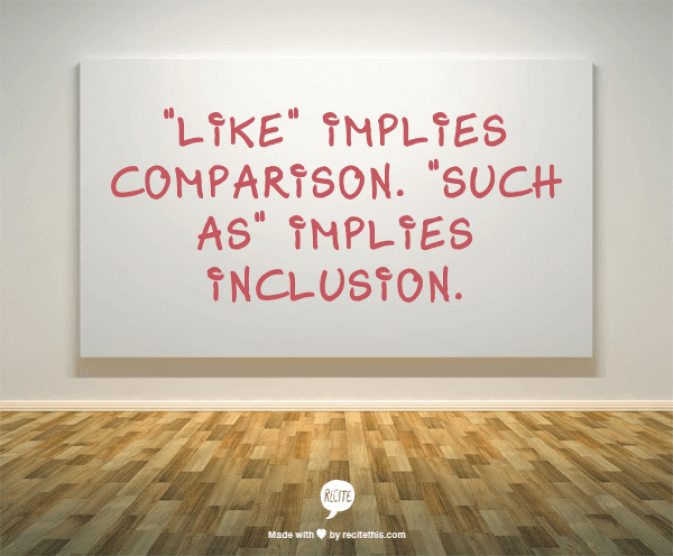Today’s topic is “like” versus “such as.”
“Like” Versus “Such As”
Should you write, “Chuck enjoys desserts such as brownies, cheesecake, and macaroons” or “Chuck enjoys desserts like brownies, cheesecake, and macaroons”? Either is acceptable to many grammarians and veteran writers, but let’s look at why using “such as” is better in this instance.
When Should You Use “Such As” Instead of “Like”?
Note that the second example suggests a comparison (like brownies…), whereas the first example implies inclusion (such as brownies…), and that’s precisely what is meant. In other words, many consider likeness as not being the thing itself. When you say “desserts like brownies,” you’re implying that you don’t enjoy brownies themselves, but instead enjoy a different dessert similar to brownies. It’s a subtle difference, but one to be aware of.
Here are a few more examples:
Brad laughs when he hears words such as “flabbergasted,” “rutabaga,” and “hornswoggle.” (The “such as” tells us that “flabbergasted,” “rutabaga,” and “hornswoggle” are included in the list of words that make Brad laugh.)
Characters like Cinderella, Dracula, and Frankenstein continue to appear in movies and novels. (The “like” tells us characters that are comparable to Cinderella, Dracula, and Frankenstein continue to appear in movies and novels.)
Jill would love to travel to several European cities such as London, Florence, and Athens. (The “such as” tells us these are specific cities Jill wants to see.)
Doctor Coughlin dreads seeing patients like Mrs. Carbuncle. (The “like” tells us there are other patients as difficult as Mrs. Carbuncle and Doctor Coughlin doesn’t enjoy seeing them either.)
And in the following case, the sentence is OK either way, depending on the intended meaning:
A zombie like Zeke should be small and sneaky.
A zombie such as Zeke should be small and sneaky.
Divided Opinion on “Like” Versus “Such As”
Why do you think there are mixed views regarding the usage of our words in question? Some language experts, such as Patricia O’Connor (the author of Woe Is I), state that “’like’ sounds better” because “’such as’ has a more formal air” (1). I both disagree and agree with her. To my ear, “such as” sounds better in the sentence about Chuck’s favorite desserts: Chuck enjoys desserts such as brownies, cheesecake, and macaroons. However, I do agree that “such as” does sometimes have a more formal air to it, but I don’t find that air stifling.
I agree that “such as” sometimes has a more formal air to it, but I don’t find that air stifling.
That contrasting view has actually existed for at least a century. For example, in the enduring Dictionary of English usage by H. W. Fowler, we find this line: “Opinion is neatly divided about the merits of ‘like’ or ‘such as’…” (2). What Fowler then points out about these distinctions is worth noting. He wrote, “The choice is often governed by the meaning: if the sense required is ‘resembling’ then ‘like’ is preferable. And there is much to be said in favour of ‘such as’ when more than one example of a class [that is, a group] is mentioned” (3). Here’s a group-related example:
Of our body’s many vital organs, such as the heart, the kidneys, and the liver, people may not know that “The skin is the largest organ in the human body” (4).
What Punctuation Should You Use with “Such As”?
There is one more issue regarding “such as” that needs to be addressed. Many people incorrectly include a comma or a colon when using “such as.”
Don’t use a comma or a colon in the following situations:
Instrumental music, such as [no comma] classical and jazz, helps Jessica draw better.
The clippings in Kristen’s Funny Writing box include topics such as [no colon] dangling participles, spoonerisms, and eggcorns.
When Do You Use a Comma with “Such As”?
Now you might be wondering why a comma is included before “such as” in that first example but not in the second. It’s because in the first sentence the “such as” phrase is part of a nonrestrictive (nonessential) clause, so a comma is needed; in other words, you can take out the such as phrase, and the sentence will still make sense.
Instrumental music, such as classical and jazz, helps Jessica draw better.
Instrumental music helps Jessica draw better.
In contrast, because the such as phrase in the second example sentence is restrictive (essential), a comma doesn’t go there; in other words, “The clippings in Kristen’s Funny Writing box include topics” needs the additional “such as” phrase to complete the meaning of the sentence.
For further clarification, let’s go back to an earlier example: “Jill would love to travel to several European cities” is a main clause (it conveys a complete thought), and the phrase “such as London, Florence, and Athens” gives additional but nonessential information; therefore—according to many style guides and writers’ handbooks— a comma is needed before “such as.” Many writers, however, intentionally break that usage rule to avoid bumpy comma-crowding.
So, again, you can see that rulings are mixed in this closely contested match between “like” and “such as.”
Geoff Pope
This podcast was written by Geoff Pope, who teaches English at City University of Seattle and can be found online at www.geoffpope.com. The article was edited and read in the podcast by Mignon Fogarty, author of the New York Times bestseller Grammar Girl’s Quick and Dirty Tips for Better Writing.
References
- 1. O’Connor, P. Woe Is I: The Grammarphobe’s Guide to Better English in Plain English. New York: Riverhead Books, 2003, p. 103
- 2-3. Burchfield, R. W., ed. The New Fowler’s Modern English Usage. Third edition. New York: Oxford, 1996, p. 750.
- 4. Stafford, P. Your Skin: The Largest Organ of the Human Body. Click this link (accessed on August 23, 2010).




